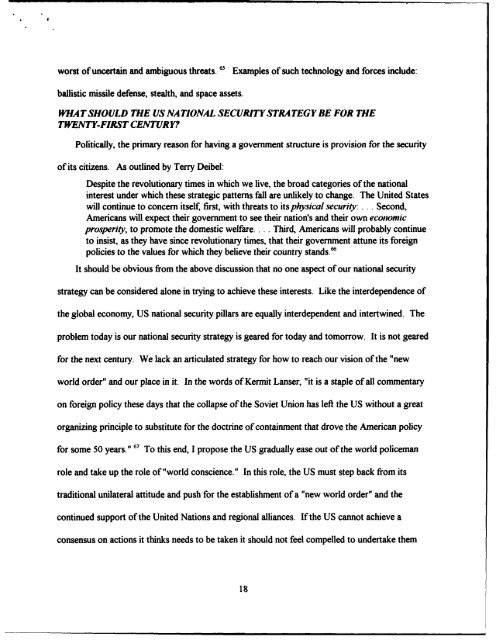"New World Order" And Its Implications For US ... - The Black Vault
"New World Order" And Its Implications For US ... - The Black Vault
"New World Order" And Its Implications For US ... - The Black Vault
Create successful ePaper yourself
Turn your PDF publications into a flip-book with our unique Google optimized e-Paper software.
worst of uncertain and ambiguous threats. 65<br />
Examples of such technology and forces include:<br />
ballistic missile defense, stealth, and space assets.<br />
WIA T SHOULD THE <strong>US</strong> NATIONAL SECURITY STRATEGY BE FOR THE<br />
TWENTY-FIRST CENTURY?<br />
Politically, the primary reason for having a government structure is provision for the security<br />
of its citizens. As outlined by Terry Deibel:<br />
Despite the revolutionary times in which we live, the broad categories of the national<br />
interest under which these strategic patterns fall are unlikely to change. <strong>The</strong> United States<br />
will continue to concern itself, first, with threats to its physical security: ... Second,<br />
Americans will expect their government to see their nation's and their own economic<br />
prosperity, to promote the domestic welfare.... Third, Americans will probably continue<br />
to insist, as they have since revolutionary times, that their government attune its foreign<br />
policies to the values for which they believe their country stands. 66<br />
It should be obvious from the above discussion that no one aspect of our national security<br />
strategy can be considered alone in trying to achieve these interests. Like the interdependence of<br />
the global economy, <strong>US</strong> national security pillars are equally interdependent and intertwined. <strong>The</strong><br />
problem today is our national security strategy is geared for today and tomorrow. It is not geared<br />
for the next century. We lack an articulated strategy for how to reach our vision of the "new<br />
world order" and our place in it. In the words of Kermit Lanser, "it is a staple of all commentary<br />
on foreign policy these days that the collapse of the Soviet Union has left the <strong>US</strong> without a great<br />
organizing principle to substitute for the doctrine of containment that drove the American policy<br />
for some 50 years." 67<br />
To this end, I propose the <strong>US</strong> gradually ease out of the world policeman<br />
role and take up the role of "world conscience." In this role, the <strong>US</strong> must step back from its<br />
traditional unilateral attitude and push for the establishment of a "new world order" and the<br />
continued support of the United Nations and regional alliances. If the <strong>US</strong> cannot achieve a<br />
consensus on actions it thinks needs to be taken it should not feel compelled to undertake them<br />
18

















